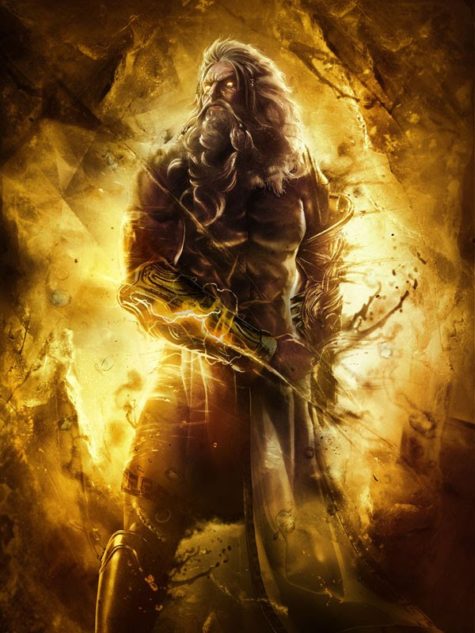The Fifty Names of Marduk
When Babylon became the capital of Mesopotamia, Marduk, the patron deity of Babylon was elevated to the level of supreme god. Acknowledged as the creator of the universe and of humankind, the god of light and life, and the ruler of destinies, he rose to such eminence that he claimed 50 titles. His name literally means “bull calf of the sun”.
The Enûma Elish, an epic poem of creation, tells the story of Marduk’s birth, heroic deeds and becoming the ruler of the gods. Included in this document are the fifty names of Marduk. Here they are:
Let us then proclaim his fifty names
‘He whose ways are various, whose deeds are likewise.”
One:
MARDUK, as An, his father,”‘ called him from his birth;
Who provides grazing and drinking places, enriches their stalls,
Who with the flood-storm, his weapon, vanquished the detractors,
Who the gods, his fathers, rescued from distress.
Truly, the Son of the Sun,”‘ most radiant of gods is he.
In his brilliant light may they walk forever!
On the people he brought forth, endowed with life,
The service of the gods he imposed that these may have ease.
Creation, destruction, deliverance, grace-
Shall be by his command.”‘ They shall look up to him!
Two:
MARUKKA verily is the god, creator of all,
Who gladdens the heart of the Anunnaki (earth spirits),
appeases their spirits.
Three:
MARUTUKKU verily is the refuge of the land, protection of its people.
Unto him shall the people give praise.
Four:
BARASHAKUSHU… stood up and took hold of its… reins;
Wide is his heart, warm his sympathy.
Five:
LUCALDIMMFRANKIA is his name which we proclaimed in our Assembly.
His commands we have exalted above the gods, his fathers.
Verily, he is lord of all the gods of heaven and earth,
The king at whose discipline the gods above and below are in mourning.
Six:
NARI-LUGALDIMMNKIA is the name of him Whom we have called the monitor”‘ of the gods;
Who in heaven and on earth founds for us retreats”‘ in trouble,
And who allots stations to the Igigi (Sky Spirits) and Anunnaki.
At his name the gods shall tremble and quake in retreat.
Seven:
ASARULUDU is that name of his Which Amu, his father, proclaimed for him.
He is truly the light of the gods, the mighty leader, Who, as the protecting deities”‘ of gods and land,
In fierce single combat saved our retreats in distress. Asaruludu, secondly, they have named
Eight:
NAMTILLAKU,The god who maintains life,
Who restored the lost gods, as though his own creation;
The lord who revives the dead gods by his pure incantation,
Who destroys the wayward foes.
Let us praise his prowess!…
Nine:
Asaruludu, whose name was thirdly called NAMRU,
The shining god who illumines our ways.
Three each of his names have Anshar, Lahmu, and Lahamu proclaimed;
Unto the gods, their sons, they did utter them:
“We have proclaimed three each of his names.
Like us, do you utter his names!”
Joyfully the gods did heed their command,
As in Ubshukinna their exchanged counsels:
“Of the heroic son, our avenger,
Of our supporter we will exalt the name!”
They sat down in their Assembly to fashion”‘ destinies,
All of them uttering his names in the sanctuary.
Ten:
ASARU, bestower of cultivation, who established water levels;
Creator of grain and herbs,
Who causes vegetation to sprout.
Eleven:
ASARUALIM, who is honored in the place of counsel,
Who excels in counsel;
To whom the gods hope, when possessed of fear.
Twelve:
ASARUALIMNUNNA, the gracious, light of the father, his begetter,
Who directs the decrees of Anu, Enlil, and Eal.
He is their provider who assigns their portions,
Whose horned cap is plenty, multiplying …
Who banishes consternation from the body of the gods,
Thirteen:
TUTU is he, who effects their restoration.
Let him purify their shrines that they may have ease.
Let him devise the spell that the gods may be at rest.
Should they rise in anger, let them turn back.
Verily, he is supreme in the Assembly of the gods;
No one among the gods is his equal.
Fourteen:
Tutu is ZIUKKINNA, life of the host of the gods,
Who established… for the gods the holy heavens;
Who keeps a hold on their ways, determines their courses;
He shall not be forgotten by the beclouded.
Let them remember … his deeds!
Tutu they thirdly called
Fifteen:
ZIKU, who establishes holiness,
The god of the benign breath, the lord who hearkens and accedes;
Who produces riches and treasures, establishes abundance;…
Who has turned all our wants to plenty;
Whose benign breath we smelled in sore distress.
Let them speak, let them exalt, let them sing his praises!
Sixteen:
Tutu, fourthly, let the people magnify as AGAKU,
The lord of the holy charm, who revives the dead;
Who had mercy on the vanquished gods,
Who removed the yoke imposed on the gods, his enemies,
And who, to redeem them, created mankind;
The merciful, in whose power it lies to grant life.
May his words endure, not to be forgotten,
In the mouth of the black-headed, whom his hands have created.
Seventeen:
TUKU, whose holy spell their mouths shall murmur;
Who with his holy charm has uprooted all the evil ones.
Eighteen:
SHAZU, who knows the heart of the gods,
Who examines the inside;
From whom the evildoer cannot escape;
Who sets up the Assembly of the gods, gladdens their hearts;
Who subdues the insubmissive; their wide-spread protection;
Who directs justice, roots out crooked talk,
Who wrong and right in his place keeps apart.
Nineteen:
Shazu may they, secondly, exalt as ZISI,
Who silences the insurgent; his fathers.”‘
Twenty:
Shazu is, thirdly, SUHRIM, who with the weapon roots out all enemies
Who frustrates their plans, scatters them to the winds;
Who blots out all the wicked ones who tremble before him.
Let the gods exult, let them.
Twenty One:
Shazu is, fourthly, SUHGURIM, who insures… a hearing,
Creator of the gods, his fathers,
Who roots out the enemies, destroys their progeny;
Who frustrates their doings, leaving nothing of them.
May his name be evoked and spoken in the land!
Twenty Two:
Shazu, fifthly, they shall praise as ZAHRIM, the lord of the lightning,
Pursues the evil;
Who all the fugitive gods brought home to their shrines.
May this his name endure!
Twenty Three:
To Shazu, moreover, they shall, sixthly, render all honor as ZAHGURIM,
Who all the foes destroyed as though in battle.
Twenty Four:
ENBILULU, the lord who makes them flourish, is he ,
The mighty one who named them,
who instituted roast offerings;
Who ever regulates for the land the grazing and watering places;
Who opened the wells, apportioning waters of [… ].
Twenty Five:
Enbilulu, secondly, they shall glorify as EPADUN,
The lord who sprinkles the field,
Irrigator”‘ of heaven and earth, who establishes seed rows,
Who plow land and grazing land,
Dam and ditch regulates, who delimits the furrow.
Twenty Six:
Enbilulu, thirdly, they shall praise as ENBILULU-GUGAL,
The irrigator of the plantations of the gods;
Lord of abundance, opulence, and of ample crops,
Who provides wealth, enriches all dwellings,
Who furnishes millet, causes barley to appear.
Twenty Seven:
Enbilulu is HFGAL,
Who heaps up abundance for the people’s consumption;
Who causes rich rains over the wide earth, provides vegetation.
Twenty Eight:
SIR. SIR, who heaped up a mountain over her, Tiamat,
Who the corpse of Tiamat carried off with his weapon;
Who directs the land-their faithful shepherd;
Whose hair is a grain field, his horned cap furrows;
Who the wide-spreading Sea vaults in his wrath,
Crossing her like a bridge at the place of single combat.
Twenty Nine:
Sirsir, secondly, they named MALAH-and so forth-
Tiamat is his vessel and he the rider.
Thirty:
GIL, who stores up grain heaps-massive mounds
Who brings forth barley and millet, furnishes the seed of the land.
Thirty One:
GILMA, who makes lasting the lofty abode of the gods,
Creator of security,
The hoop that holds the barrel together, who presents
Thirty Two:
ARILMA, the exalted one, who tears off the crown
Who creates the clouds above the waters,
Who makes enduring the heavens.
Thirty Three:
ZULUM, who designates the fields
Who grants portions and food-offerings, tends the …
Who destroys all adversaries, who maintains . . . good things.
Thirty Four:
MUMMU (thunder or roaring of the sea),
Creator of heaven and earth, who directs …
The god who sanctifies heaven and earth is, secondly Zulummar,
Thirty Five:
ZULUMMAR,
Whom no other among the gods can match in strength.
GISHNUMUNAB,
Creator of all people, who made the world regions,
Destroyer of the gods of Tiamat;
Who made men out of their substance.
Thirty Six
LUGALABDUBUR, the king who frustrated the work of Tiamat,
Rooted out her weapons;
Whose foundation is firm in front and in the rear.
Thirty Seven:
PAGALGUENNA, the foremost of all the lords,
Whose strength is outstanding;
Who is pre-eminent among the gods, his brothers,
Master of them all.
Thirty Eight:
LUGALDURMAH, the king, bond of the gods, lord of the Durmah,
Who is pre-eminent in the abode of the gods, most exalted of the gods.
Thirty Nine:
ARANUNNA, counselor of Ea, creator of the gods, his fathers,
Whose princely ways no god whatever can equal.
Forty:
DUMUDUKU,
Whose pure dwelling is renewed in Duku;
Forty One:
Dumuduku, without whom LUGALKUDUGA makes no decision.
Forty Two:
LUGALLANNA, the king whose strength is outstanding among the gods,
The lord, strength of Anu, who became supreme at Anshar.
Forty Three:
LUGALUCCA, who carried off all of them amidst the struggle,
Who all wisdom encompasses, broad in perception.
Forty Four:
IRKINGU, who carried off Kingu in the thick”‘ of the battle
Who conveys guidance for all, establishes rulership.
Forty Five:
KINMA, who directs all the gods, the giver of counsel,
At whose name the gods quake in fear, as at the storm.
Forty Six:
ESIZKUR shall sit aloft in the house of prayer;
May the gods bring their presents before him,
That from him they may receive their assignments;
None can without him create artful works.
Four black-headed ones are among his creatures;…
Aside from him no god knows the answer as to their days.
Forty Seven:
GIBIL, who maintains the sharp point of the weapon,
Who creates artful works in the battle with Tiamat;
Who has broad wisdom, is accomplished in insight,
Whose mind”-‘ is so vast that the gods, all of them, cannot fathom it.
Forty Eight:
ADDU be his name, the whole sky may he cover.
May his beneficent roar ever hover over the earth;
May he, as Mummu, diminish the clouds;…
Below, for the people may he furnish sustenance.
Forty Nine:
ASHARU, who, as is his name, guided the gods of destiny; of all the gods is verily in his charge.
Fifty:
NEBIRU shall hold the crossings of heaven and earth;
Those who failed of crossing above and below,
Ever of him shall inquire.
Nebiru is the star… which in the skies is brilliant.
Verily, he governs their turnings,”‘ to him indeed they look,
Saying: “He who the midst of the Sea restlessly crosses,
Let ‘Crossing’ be his name, who controls… its midst.
May they uphold the course of the stars of heaven;
May he shepherd all the gods like sheep.
May he vanquish Tiamat; may her life be strait and short!…
Into the future of mankind, when days have grown old,
May she recede… without cease and stay away forever.’
Because he created the spaces and fashioned the firm ground,
Father EnlIL called his name LORD OF THE LAND.
When all the names which the Igigi proclaimed, Ea had heard, his spirit rejoiced,
Thus: “He whose names his fathers have glorified,
He is indeed even as 1; his name shall be Ea.
All my combined rites he shall administer;
All my instructions he shall carry out!”
With the title “Fifty” the great gods
Proclaimed him whose names are fifty and made his way supreme.
Epilogue
Let them be kept in mind and let the leader explain them.
Let the wise and the knowing discuss them together.
Let the father recite them and impart to his son.
Let the ears of shepherd and herdsman be opened.
Let him rejoice in Marduk, the Enlil of the gods,
That his land may be fertile and that he may prosper.
Firm in his order, his command unalterable,
The utterance of his mouth no god shall change.
When he looks he does not turn away his neck;
When he is angry, no god can withstand his wrath. Vast is his mind, broad his sympathy;
Sinner and transgressor will be confounded before him.
The teaching which the leader has voiced in his presence…
(The few remaining lines are too fragmentary for translation.)
From E. A. Speiser
Note:
These fifty names were adapted into the mythology of the Necronomicon (a work of fiction by H P Lovecraft), and in the Necronomicon Spellbook, were assigned Sigils and words of power. They can be found here: About The Fifty Names of Marduk
2 Responses to The Fifty Names of Marduk
Leave a Reply
Yānā Moon: Charge of the Dark Goddess
James Cheney: Invocation To The Dark Mother
Daniel: Prayer Before The Final Battle
blessed obyno: Queen of Ghosts
blessed obyno: Queen of Ghosts





thank you
Gracias 🙏💙